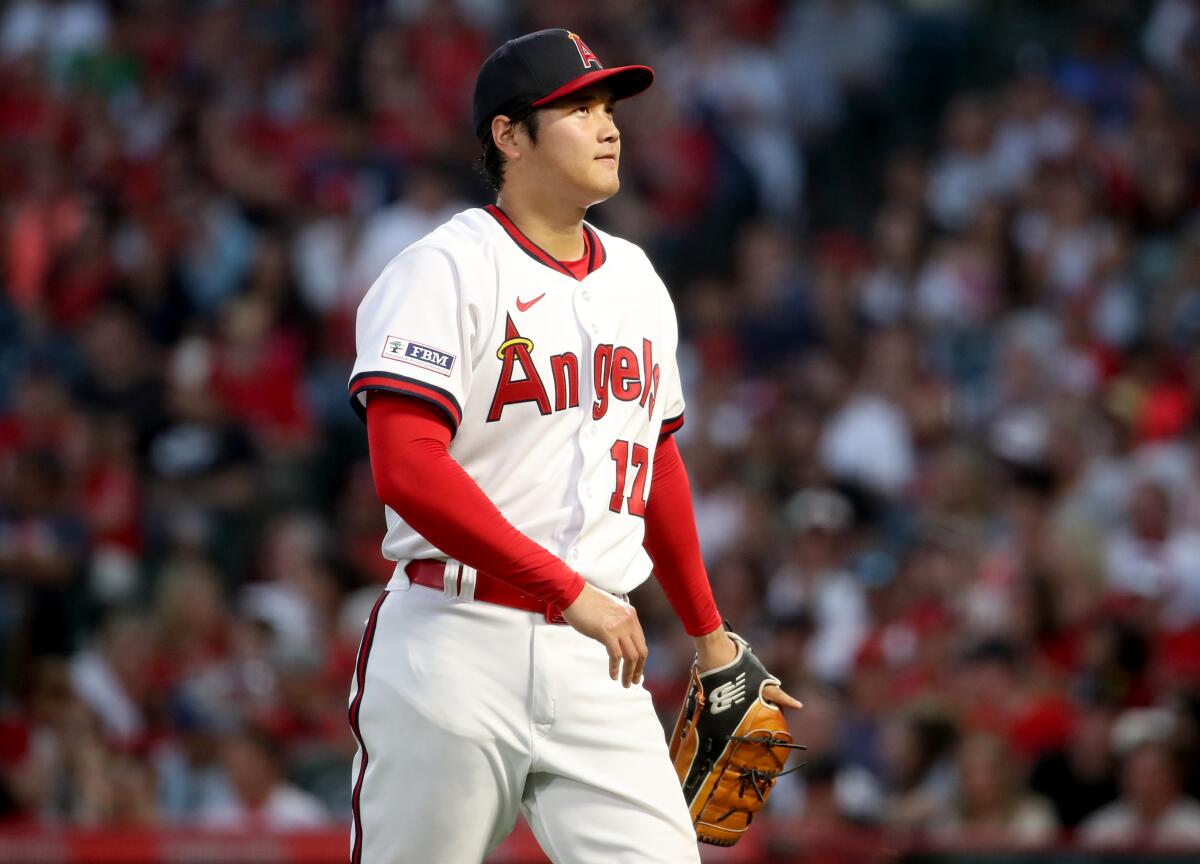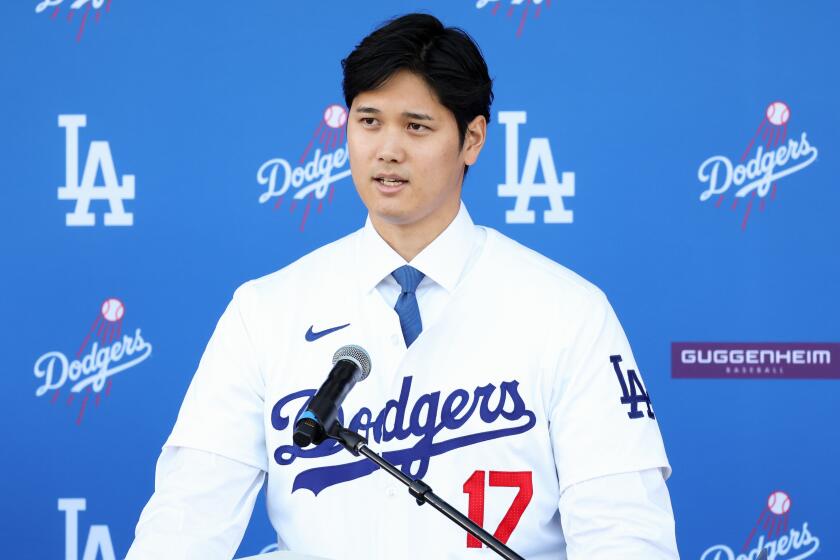Shohei Ohtani deferring $68 million annually on his 10-year Dodgers contract

- Share via
For years, the baseball world speculated that money wasn’t Shohei Ohtani’s top priority.
Now, there is no doubt.
Under his new 10-year, $700-million contract with the Dodgers, the two-way star will defer all but $2 million of his annual salary until after the deal is completed, according to a person with knowledge of the situation unauthorized to speak publicly. The Athletic first reported the news Monday.
The extremely unusual structure — in which Ohtani will receive $68 million payments annually from 2034 to 2043, without interest, following the completion of the 10-year pact — was Ohtani’s idea, the person said, encouraged by the two-time MVP in the hopes of attracting more star players to join him in Los Angeles over the next decade.
Shohei Ohtani, baseball’s top free agent, agrees to a $700-million deal with the Dodgers. Here’s everything you need to know about Ohtani joining the Dodgers.
As for the $700-million price tag? Its true value will be more in the $460-million range, when calculating by present day value (since money in the future, because of inflation, isn’t as valuable as money now).
For luxury tax purposes, Ohtani’s salary will count only as $46 million on the team’s payroll. Typically, it is the annual average value of the contract, which in this case would have been $70 million, that counts for luxury tax purposes.
In other words, Ohtani will be saving the Dodgers $68 million in actual payroll and $24 million in luxury tax payroll, each year during his deal.
For the Dodgers, what initially seemed to be a bargain is now bordering on a club-altering steal.
They get the 29-year-old two-way star they had long coveted. They keep the kind of payroll flexibility they have long prioritized. And now, they probably can approach the rest of the free-agent market in a similar manner to as if they’d never acquired Ohtani.
The team has roughly $142 million in payroll commitments for next season (about $80 million less than it spent last year) and still $16 million of space remaining before it even eclipses the league’s first luxury tax threshold.
Ohtani, on the other hand, is sacrificing — if not literal dollars — how much the totality of the deal is effectively worth.

According to the person with knowledge of his thinking, however, such an approach became the Japanese star’s preference as dollar figures in contract negotiations grew larger and larger.
The reason: Ohtani cared more about winning than money. He was already well-compensated off the field, believed to be the sport’s highest earner in endorsement contracts. And as he learned more about the implications that uber-high salaries can have on a team’s payroll and luxury tax situation, he felt it was the best way to help his new club be successful.
In the end, it was described as an easy decision for the six-year big leaguer.
Around the industry, however, the contract was met with shock.
While MLB’s collective bargaining agreement doesn’t limit the amount of money that can be deferred in a contract, no player has ever been willing to wait for such a massive portion of his total guaranteed salary.
The deal will still require the Dodgers to spend some extra money in the near-term, beyond just the $2 million Ohtani will make annually, since the CBA stipulates that each season’s deferral must be “fully funded by the club” within two years of the season in question (i.e. Ohtani’s deferred salary for next year must be funded by 2026, and so on).
However, the club can use funding mechanisms such as cash and/or “readily marketable securities” to do so, allowing it to save significantly more than if it had to pay it all up front.
There is no option for the deferred money to be converted into an ownership stake in the future, either.
While Ohtani is believed to have taken a similar approach in his negotiations with other clubs, it is the Dodgers who will benefit from his apparent generosity.
The Dodgers and two-way star Shohei Ohtani have reached agreement on a 10-year, $700-million contract.
As people around the sport had long suspected, he entered his first MLB free agency more worried about finding — and helping contribute to — a winning club than maximizing his own bottom line.
Before news of Ohtani’s deferral amount broke, the Dodgers cleared the necessary space to add him to their roster.
In a minor trade, the team sent reliever Victor González and infield prospect Jorbit Vivas (who were both on their 40-man roster) to the New York Yankees for shortstop prospect Trey Sweeney (who won’t have to be placed on their 40-man roster).
The cleared roster space allowed the Dodgers to officially announce their contracts with Ohtani and reliever Joe Kelly, who agreed to a one-year, $8 million deal last month.
Times staff writer Bill Shaikin contributed to this report.
More to Read
Are you a true-blue fan?
Get our Dodgers Dugout newsletter for insights, news and much more.
You may occasionally receive promotional content from the Los Angeles Times.











